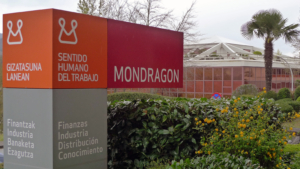

Basque Country has a strong culture of cooperatives and employee ownership, which have one defining purpose: protecting workers.
One example is the Mondragón Corporation, which is a vast collection of 96 cooperative enterprises. Its cooperatives employ more than 70,000 people in Spain, making it one of the nation’s largest sources of paychecks. They have annual revenues of more than 12 billion euros ($14.5 billion). The group includes one of the country’s largest grocery chains, Eroski, along with a credit union and manufacturers that export their wares around the planet.
Most of its workers are partners, meaning they own the company. Though the 96 cooperatives of the Mondragón Corporation must produce profits to stay in business — as any company does — these businesses have been engineered not to lavish dividends on shareholders or shower stock options on executives, but to preserve paychecks.
In the town of Mondragón, the cooperatives trace their origins to the wreckage of the Spanish Civil War in the early 1940s, when a priest, José M. Arizmendiarrieta, arrived in the area bearing unorthodox ideas about economic betterment. The priest viewed cooperative principles as the key to lifting living standards.
Find out more here.
Find out more:
the discussion?
Let us know what
you would like
to write about!
